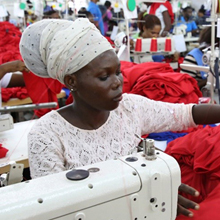Rapid, private sector-led growth is essential for ending extreme poverty and boosting shared prosperity, the World Bank Group’s Twin Goals. For the past three decades, economic growth centered on strong contributions from the private sector has been the main driver of poverty reduction around the world.
It is estimated that one billion young people will enter the labor market between 2015 and 2030. This brings the role of the private sector the largest engine of economic transformation and provider of good jobs to the forefront for governments around the world. Economic transformation depends on a growing private sector and a shifting role for the public sector – from a primary source of formal wager employment to facilitator and enabler of efficient markets.
But growth by itself is not enough. Patterns of growth and trends in income inequality also matter if poor are to benefit. In countries afflicted by slow growth and pervasive poverty, for instance, poverty declines when growth patterns become more labor intensive and when poor people’s work becomes more productive. Also critical to poverty reduction is reduced income inequality and improved quality of jobs for the hundreds of millions who are underemployed or work in the informal work
Achieving the Bank’s twin goals will require unparalleled efforts by developing countries to expand market opportunities, enable private initiative, and develop dynamic economies. By most estimates, achieving the goal of reducing extreme poverty to no more than 3 percent by 2030 requires national growth rates well above historical precedents. The private sectors in lower- and middle-income countries and in fragile and conflict-affected states will need to be more dynamic in identifying opportunities, competing and innovating, and creating jobs. They cannot do it alone. Governments will need to ensure economy-wide incentive frameworks for broad-based growth, and aggressively work to improve the business climate and human capital. This, in turn, depends on coordinated global actions to ensure an open multilateral trading system.
Last Updated: Oct 07, 2019



